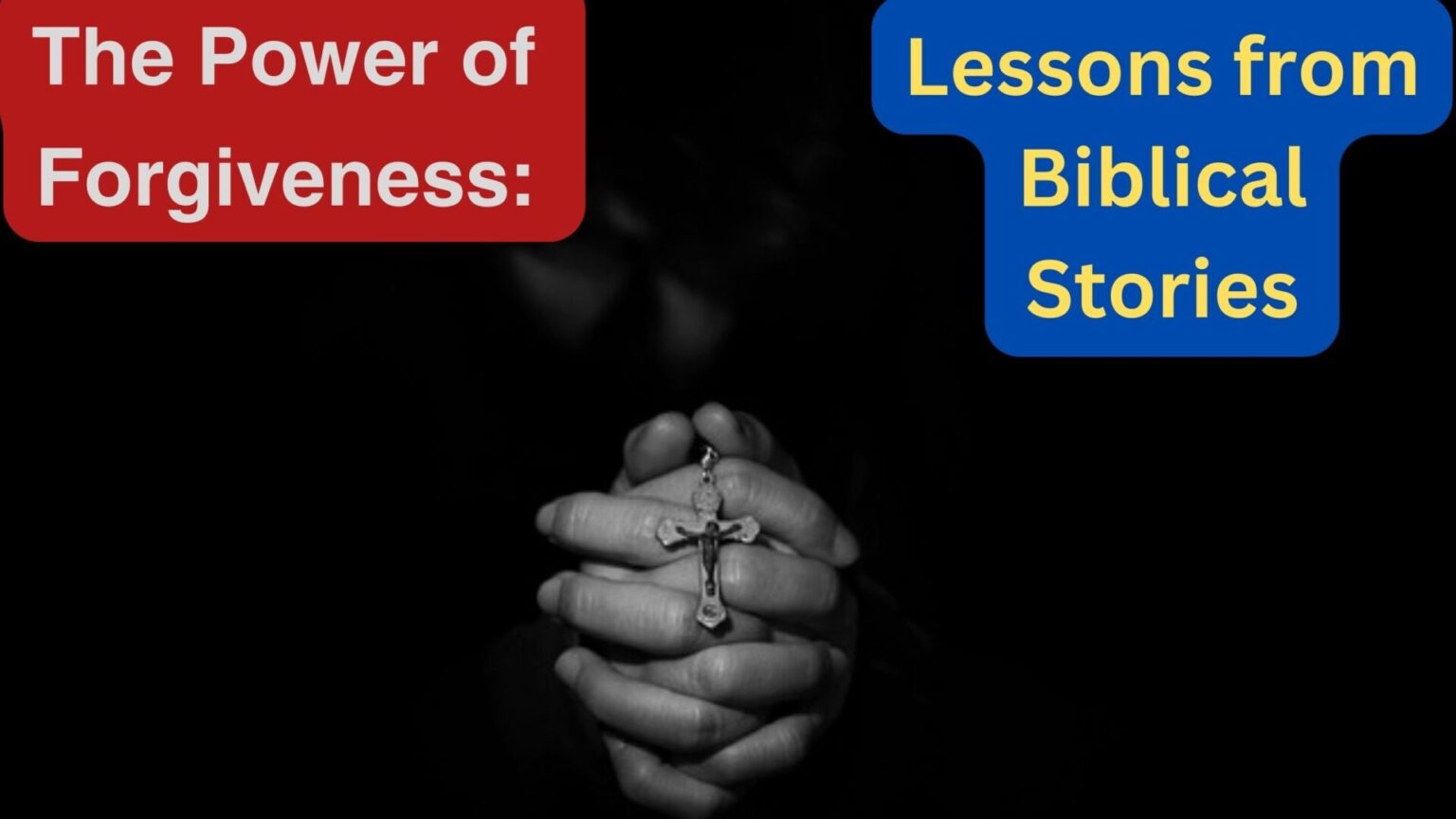Introduction:
The Power of Forgiveness: Lessons from Biblical Stories

In a world often marked by conflict and strife, the concept of forgiveness stands as a beacon of hope and healing. Throughout the pages of the Bible, we encounter stories of forgiveness that exemplify the transformative power of letting go of resentment and embracing reconciliation. From the Old Testament to the New Testament, these narratives offer profound insights and timeless lessons that continue to resonate with believers today.
The Power of Forgiveness
Joseph and His Brothers: One of the most poignant examples of forgiveness in the Bible is found in the story of Joseph and his brothers (Genesis 37-50). Betrayed by his own siblings, Joseph endured years of hardship, including being sold into slavery and falsely accused. Yet, when the opportunity for revenge presented itself, Joseph chose a different path. Instead of seeking vengeance, he forgave his brothers, recognizing that what they meant for evil, God intended for good. Joseph’s act of forgiveness not only restored his fractured family but also paved the way for reconciliation and healing.
The Parable of the Prodigal Son: In the New Testament, Jesus taught about forgiveness through the parable of the prodigal son (Luke 15:11-32). In this story, a wayward son squanders his inheritance on reckless living and finds himself destitute. Upon realizing the error of his ways, he humbly returns to his father, hoping for forgiveness. Rather than meting out punishment, the father welcomes his son with open arms, demonstrating unconditional love and forgiveness. Through this parable, Jesus illustrates God’s boundless mercy and the transformative power of forgiveness, no matter how far we may have strayed.
Stephen’s Forgiveness: Even in the face of persecution and martyrdom, forgiveness remained central to the message of Christianity. As he was being stoned to death for his faith, Stephen, the first Christian martyr, echoed the words of Jesus by praying for forgiveness for his attackers (Acts 7:54-60). In his final moments, Stephen exemplified the radical love and forgiveness taught by Christ, setting an enduring example for believers to follow.
Lessons Learned: These biblical stories of forgiveness offer profound insights into the human condition and the redemptive power of forgiveness. They teach us that forgiveness is not a sign of weakness but of strength, allowing us to break free from the chains of bitterness and resentment. Moreover, they remind us that forgiveness is not merely a transactional act but a transformative process that leads to reconciliation and healing.
How does the concept of forgiveness in the Bible align with or differ from cultural or societal norms regarding forgiveness today?
The concept of forgiveness in the Bible shares similarities with cultural and societal norms regarding forgiveness today, but there are also significant differences in emphasis and application:

- Similarities:
- Both the Bible and modern society recognize forgiveness as a virtue that promotes healing, reconciliation, and inner peace.
- Both emphasize the importance of letting go of resentment and bitterness towards those who have wronged us.
- Both acknowledge that forgiveness can be a difficult and ongoing process, requiring patience, humility, and empathy.
- Both promote the idea that forgiveness benefits not only the person being forgiven but also the one offering forgiveness, freeing them from the burden of anger and resentment.
- Differences:
- The Bible often emphasizes forgiveness as a divine command or moral obligation, rooted in the belief that humans are created in the image of a forgiving God. In contrast, modern society may view forgiveness more as a personal choice or psychological benefit, rather than a religious imperative.
- The Bible frequently links forgiveness to repentance and reconciliation, suggesting that forgiveness is contingent upon genuine remorse and a willingness to make amends. In some cultural contexts today, forgiveness may be viewed more as a unilateral act, independent of the wrongdoer’s actions or intentions.
- The Bible presents forgiveness as an act of grace and mercy, reflecting God’s character of love and compassion. While modern society may also value forgiveness, its emphasis on justice and accountability may sometimes overshadow the grace-based approach found in the Bible.
- In some cultural contexts, forgiveness may be seen as a sign of weakness or as condoning wrongdoing, whereas the Bible portrays forgiveness as a sign of strength and moral courage.
What does the Bible teach us about the relationship between forgiveness and justice? How do biblical characters navigate the tension between seeking justice for wrongdoing and extending forgiveness?
The relationship between forgiveness and justice is a complex and nuanced theme in the Bible, and biblical characters often navigate this tension in various ways. Here are some key teachings and examples:

- Biblical Teachings:
- The Bible emphasizes the importance of both forgiveness and justice as fundamental aspects of God’s character. Psalm 89:14 declares, “Righteousness and justice are the foundation of your throne; love and faithfulness go before you.”
- While forgiveness involves letting go of resentment and offering mercy to those who have wronged us, justice involves upholding moral order and holding wrongdoers accountable for their actions.
- The Bible teaches that forgiveness does not necessarily negate the need for justice. Instead, forgiveness often coexists with the pursuit of justice, and both are integral to God’s plan for redemption and restoration.
- Biblical Examples:
- In the story of Joseph and his brothers (Genesis 37-50), Joseph forgives his brothers for selling him into slavery, but he also ensures justice by revealing his identity and providing for his family during a time of famine. He acknowledges that while his brothers intended harm, God used their actions for good.
- King David exemplifies the tension between forgiveness and justice in his response to the betrayal and rebellion of his son Absalom (2 Samuel 13-19). Despite Absalom’s treachery, David grieves deeply over his son’s death, expressing a desire for mercy even as he upholds the rule of law and restores order to his kingdom.
- Jesus Christ embodies the ultimate reconciliation of forgiveness and justice. Through his sacrificial death on the cross, Jesus extends forgiveness to humanity, offering redemption and reconciliation. At the same time, Jesus upholds divine justice by bearing the consequences of sin and satisfying the demands of righteousness.
- Navigating the Tension:
- Biblical characters often navigate the tension between forgiveness and justice through discernment, prayer, and reliance on God’s wisdom. They recognize that while forgiveness is a virtue, it does not nullify the need for accountability or the consequences of wrongdoing.
- Additionally, biblical characters demonstrate the importance of seeking reconciliation whenever possible, even in the midst of pursuing justice. They recognize that true restoration often requires both forgiveness and a commitment to addressing the underlying causes of injustice.
Conclusion:
In a world often marked by conflict and division, the power of forgiveness shines as a beacon of hope and healing. The lessons gleaned from biblical stories of forgiveness remind us of the transformative impact that forgiveness can have on our lives and relationships. As we strive to embody the spirit of forgiveness taught by Jesus and exemplified by biblical figures like Joseph, the prodigal son, and Stephen, may we experience the profound joy and freedom that comes from letting go of past hurts and embracing reconciliation.
FAQ
**Frequently Asked Questions About Forgiveness and Justice in the Bible**
1. **What does the Bible teach about forgiveness and justice?**
The Bible emphasizes both forgiveness and justice as essential aspects of God’s character and His plan for humanity. Forgiveness involves letting go of resentment and offering mercy to those who have wronged us, while justice entails upholding moral order and holding wrongdoers accountable for their actions.
2. **Is forgiveness in the Bible synonymous with overlooking wrongdoing?**
No, forgiveness in the Bible is not synonymous with overlooking wrongdoing. While forgiveness involves letting go of resentment and offering mercy, it does not negate the need for accountability or justice. Instead, forgiveness often coexists with the pursuit of justice and reconciliation.
3. **How do biblical characters navigate the tension between forgiveness and justice?**
Biblical characters navigate the tension between forgiveness and justice through discernment, prayer, and reliance on God’s wisdom. They recognize that while forgiveness is a virtue, it does not nullify the need for accountability or the consequences of wrongdoing. They seek reconciliation whenever possible, even as they pursue justice.
References
1. Bruggemann, W. (2002). *Genesis: Interpretation: A Bible Commentary for Teaching and Preaching*. Westminster John Knox Press.
2. Keller, T. (2008). *The Prodigal God: Recovering the Heart of the Christian Faith*. Penguin Books.
3. Lewis, C. S. (2015). *The Weight of Glory: And Other Addresses*. HarperOne.
4. Nouwen, H. J. M. (1994). *The Return of the Prodigal Son: A Story of Homecoming*. Image Books.
5. Peterson, E. H. (2006). *Christ Plays in Ten Thousand Places: A Conversation in Spiritual Theology*. Wm. B. Eerdmans Publishing.
6. Stassen, G. H., & Gushee, D. P. (2003). *Kingdom Ethics: Following Jesus in Contemporary Context*. InterVarsity Press.
7. Volf, M. (2006). *Free of Charge: Giving and Forgiving in a Culture Stripped of Grace*. Zondervan.
8. Wright, N. T. (2014). *Paul: A Biography*. HarperOne.
9. Yancey, P. (1997). *What’s So Amazing About Grace?*. Zondervan.
10. Yancey, P. (2000). *The Jesus I Never Knew*. Zondervan.






